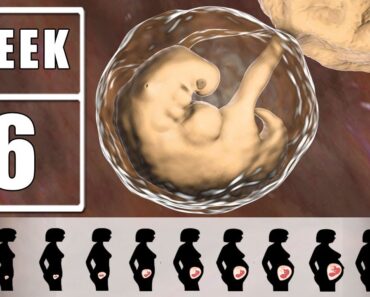Does everyone get it, are there any risks, and how does it feel?
With pregnancy comes an onslaught of tests — from ultrasounds to blood work — that regularly happen throughout your nine months. One test that can come up in the second trimester is amniocentesis.
What is amniocentesis?
Amniocentesis (“amnio” for short) is a prenatal medical test that involves a very thin, long needle being inserted through the belly into your uterus to remove a small amount of amniotic fluid from the pool of fluid your baby is sitting in. “It’s a simple procedure that only takes a minute or two to perform,” says Ken Lim, division head of Maternal Fetal Medicine at BC Women’s Hospital & Health Centre in Vancouver and the Provincial Health Services Authority. Amniocentesis is performed by a doctor, usually, one who specializes in maternal-fetal medicine.
The doctor withdraws a small amount, typically about two to three tablespoons, or 30 to 40 cubic centimeters, says Lim. To put that in context, the total amount of amniotic fluid in the uterus ranges from 250 to 500 cubic centimetres, as it varies depending on where you are in your pregnancy. The fluid replenishes hours later, explains Lim.
The amniotic fluid can give doctors genetic information about your baby, as the liquid contains cells that are representative of your baby. After the sample is taken, the fluid is sent to a lab, where it can be analyzed to directly look for genetic disorders such as Down syndrome or cystic fibrosis or indirectly for birth defects such as spina bifida (which is more often identified by ultrasound these days).
When is amniocentesis done?
Amniocentesis is the gold standard for the diagnosis of many genetic conditions that may be important to determine your baby’s health, but because it does have a risk of complications, it is only done in a select number of cases, says Lim. Your doctor may suggest this prenatal test because of an abnormal ultrasound in the first trimester, abnormal blood test results, a family history of certain birth defects, a previous child or pregnancy with a birth defect or an abnormal genetic test result (such as results from non-invasive prenatal testing, a blood test that analyzes a baby’s DNA in the mother’s blood).
The procedure is typically done between 15 and 23 weeks, says Lim who adds that sometimes they are performed later in pregnancy if there are findings either in an ultrasound or blood work that a doctor wants to investigate further. Third-trimester amniocentesis is less common, but it can be done, for example, to diagnose a uterine infection or to perform genetic testing if a birth defect is discovered late.
What are the risks of amniocentesis?
The main concern from amniocentesis is a miscarriage, as the needle punctures your uterus, creating a small hole that could bleed, not properly heal or cause amniotic fluid to leak. A uterine infection could also lead to miscarriage and rarely, the needle could also come in contact with the baby. “We use a thin needle with ultrasound guidance, so these complications are very, very uncommon, but all tests carry an inherent risk,” says Amber Samuel, a maternal-fetal medicine subspecialist and a member of the Society for Maternal-Fetal Medicine, Board of Directors, who is based in Texas.
The risk of complications quoted to patients has a wide range, anywhere from 1 in 100 to 1 in 1600, depending on which study is quoted, notes Lim.
Is amniocentesis painful?
“I describe it as a bee sting in the skin and a really bad period cramp when the needle goes through the uterus,” says Samuel, who had an amniocentesis procedure done for each of her three pregnancies. “The uterus reacts to everything the same, which is to cramp or contract and that’s why it hurts.” Because of this there isn’t any medication you can use to lessen the pain. Some doctors may offer an injectable medication to help numb the skin, but Samuel says this can be more painful than the amnio needle itself.
While everyone has a different pain threshold, she says a lot of people tend to get themselves worked up over the idea of it and after it’s over tell her it’s not as bad as they thought it was going to be. For those concerned about the pain, you could apply an over-the-counter topical numbing cream, but the main source of the discomfort from the procedure is from the needle going into the uterus, not the skin. Most women don’t have any symptoms after the test, but taking acetaminophen (Tylenol) is a safe pain reliever and can be taken if you experience abdominal muscle soreness or cramping over the next few hours or day. If either go longer than 24 hours or are severe, you should contact a doctor. “Post care, we ask that you take it easy for 24 hours, no heavy lifting or severe physical activity,” says Lim.
Amniocentesis vs CVS
Chorionic villus sampling (or CVS) is a similar type of prenatal diagnostic test to an amniocentesis procedure, that can detect birth defects and genetic diseases, but there are some key differences. First, a CVS is done earlier in pregnancy, usually between 11 and 14 weeks, says Samuel and instead of taking amniocytes from the fluid, they take a sample of the placenta to analyze.
CVS can also be done two different ways, either with a needle through your belly (like amnio) or through the cervix. Going through the cervix is more comfortable for the patient, explains Samuel, since there is no needle and the only sensation is the speculum putting pressure on your bladder (similar to a pap smear). The reason a doctor would have to go through your stomach would be due to the location of the placenta.
When it comes to the risks, a 2019 study found that CVS carries similar risk to amniocentesis. “The risk of pregnancy loss seems to be about the same when you control for the fact that people are more likely to have miscarriages earlier than later,” says Samuel.
Whether you get CVS or amniocentesis depends on where you are in your pregnancy and what your doctor is looking to find. In Canada, however, CVS is only performed in one or two centres per province given the specialized skillset and resources required. Amniocentesis is much more common.
Bottom line: Amniocentesis can provide useful information for a pregnant person but with all medical tests there are risks involved, so it’s important you discuss the risks and benefits to you and your baby, with your healthcare professional. Getting one is a personal decision with no right or wrong answer.




![গর্ভকালীন চেকআপ কখন করাবেন? কতবার করাবেন? When to get pregnancy checkup? How many times? [4K] গর্ভকালীন চেকআপ কখন করাবেন? কতবার করাবেন? When to get pregnancy checkup? How many times? [4K]](https://usparenting.com/wp-content/uploads/2021/07/1625392940_maxresdefault-370x297.jpg)




























